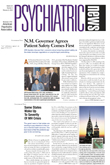The pharmaceutical industry has a new approach to assist financially strapped state Medicaid authorities. Eli Lilly and Co., the manufacturer of the largest-selling antipsychotic (Zyprexa), is funding a program in Missouri developed by Comprehensive NeuroScience Inc. that uses a computerized review of Medicaid-funded prescriptions to identify, among other factors, when physicians are prescribing two or more atypical antipsychotics to the same patient (“Medicaid Patients Benefit From Best-Practice Education Project,” November 21, 2003). The physician is then sent a letter listing which medications are being prescribed along with educational materials about the lack of empirical support and potential dangers of polypharmacy.
This program reminds me of how parents used to evoke the image of “starving Chinese villagers” to shame their children into not wasting their food. Polypharmacy can be clinically unwarranted and fiscally wasteful. But just as children not finishing their suppers has almost nothing to do with world hunger, so polypharmacy has almost nothing to do with rising medication budgets. The motivation for such a program does not grow out of the Medicaid authority’s desire to improve prescribing practices or the pharmaceutical industry’s wish for medication expenditures to be reduced. Raising the current reimbursement for a medication-management visit in Missouri from $13.50 might do much more for improved prescribing practices. If Lilly wants to reduce the budget pressures on states, for example, it could lower the cost of Zyprexa to the Canadian price.
Missouri is the “Show Me State.” Whether this particular program will reduce antipsychotic polypharmacy or save money is an empirical question. Possibly, just as the child might waste less food when reminded about starving children, so the chided physician may reduce polypharmacy. In itself this might be good. But the more important impact of such a program, like the parents’ admonition, is to evoke guilt and shift responsibility. From a public-relations perspective, the program allows the pharmaceutical industry and the Medicaid authorities to join in shifting blame for escalating medication budgets to physicians.
It took me years to figure out that all those mashed potatoes I never finished had nothing to do with some child starving in the Third World. Likewise, the problem of runaway medication budgets is not due to poor prescribing by physicians, but rather to the pharmaceutical industry’s pricing policies.
